Saladin, born in 1137, founded the Ayyubid dynasty and became the first Sultan of Egypt and Syria. Known for his military brilliance, he unified these regions and led successful campaigns against the Crusaders, with his most famous victory being the capture of Jerusalem in 1187. Renowned for his chivalry and mercy, Saladin spared Christian lives during the conquest. His legacy, marked by architectural feats like the Citadel of Cairo, endures today, with Saladin remembered as a noble, just leader who united diverse factions and resisted the Crusaders with honor.
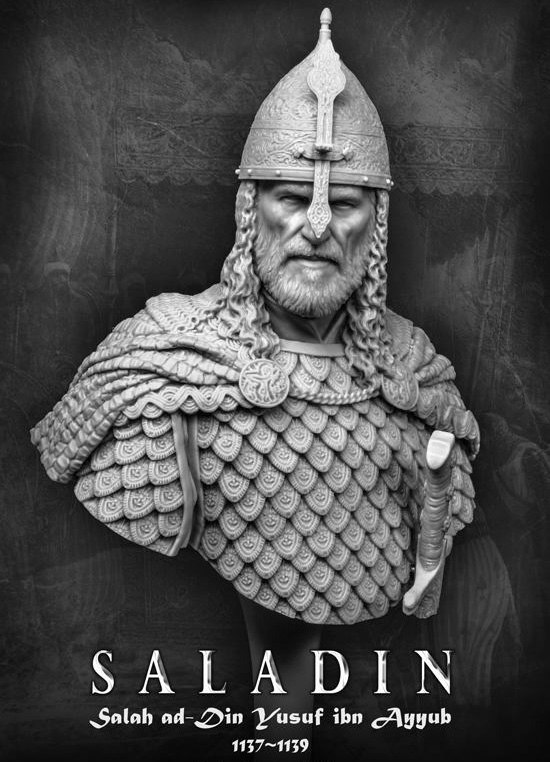
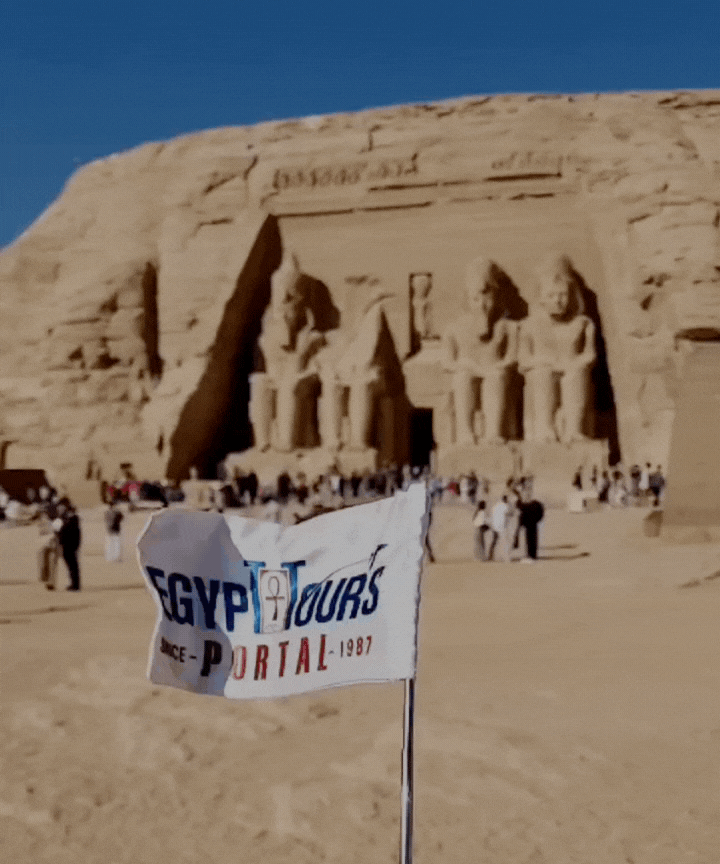
Salah Al Din is one of the greatest rulers and warriors in the history of the world, who carved his name in gold in all the history books of existence. For many ancient centuries, people on all continents knew the name of one of the greatest conquerors of all time, who desired to build a great, immortal legacy and spread peace across the nation.
There has never been a more intelligent, brave, or honorable knight than Salah Al-Din, who always showed mercy, kindness, and created some of the most captivating works of architecture that changed the course of an entire country.

Saladin, whose name means "The Righteousness of the Faith" (1137–1193 AD), was the first Sultan of Egypt and Syria and the founder of the Ayyubid dynasty, which ruled these lands from 1169 to 1250 AD. Born Salah al-Din Yusuf ibn Ayyub, Saladin is celebrated as one of Islam's greatest heroes, revered for leading successful campaigns against the Crusaders and for his unifying vision, compassion, and dedication to Islamic principles.
Rising through the military ranks under the Zengid dynasty, he was appointed vizier of Egypt in 1169, where he eventually dismantled the Fatimid Caliphate and reestablished Sunni Abbasid rule. Following the death of Nur al-Din, Saladin unified Egypt and Syria, positioning himself as the region’s main defender against the Crusaders. His most famous victory came at the Battle of Hattin in 1187, where he decisively defeated the Crusader forces, leading to the capture of Jerusalem and other cities in the Near East.
Known for his chivalry, he allowed Jerusalem's Christian inhabitants to leave safely, which contrasted with the Crusaders’ earlier conduct and solidified his reputation for mercy. In Egypt, Saladin fortified Cairo with the construction of the Citadel, establishing it as Egypt’s lasting political center and filling it with mosques and majestic structures.
His legacy of courage and justice is symbolized by the Eagle of Saladin, prominently featured on the Egyptian flag, reflecting his bravery and the admiration he inspired among both allies and adversaries. Saladin remains a model of honorable leadership, remembered across the Muslim and Western worlds for his lasting contributions to history and architecture.
Discover the amazing flags of the Egyptian civilization
Read More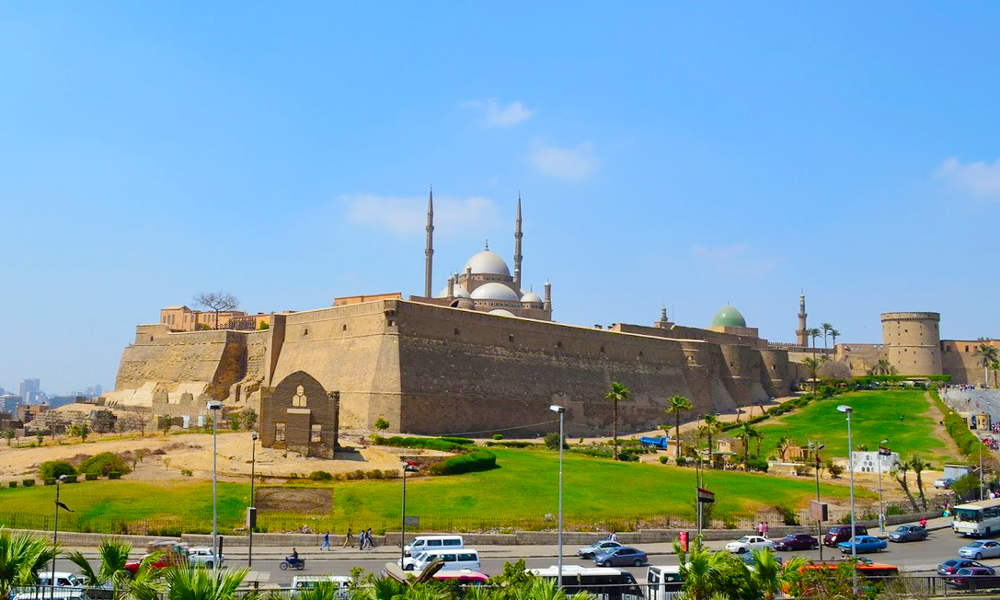
He was born as Salah al-din Yusuf Ibn Ayyub to a Kurdish Muslim family in 1137 A.D, in a small town of Tikrit in Syria. He was taught how to be a warrior and a strategist. He served as an officer in the armies of the Abbasid Caliphate of Syria. He was trained by his uncle Asad-al-Din Shirkoh, who was a commander of the Zengid Dynasty.
He was capable of taking on leading responsibilities during military campaigns due to his extraordinary performance during battles. His great capabilities and cleverly executed tactics also allowed him to evolve from being a soldier to being the King of both Egypt and Syria. In 1169, he succeeded his father as the vizier of the Abbasid Caliphate. He became the Sultan of Egypt after overthrowing the Fatimid dynasty in 1171. When he took control of Egypt, he worked on constructing a wall that went all around Al-Qahira, "Cairo".
In 1174, he began expanding his empire, and in twelve years, he was able to conquer Damascus, Aleppo, and Iraq. The entire Arabian and Western world became an admirer of his nobility and chivalry. He was able to unite all the Muslims from all across the Arab world under one vision and prepare them for Jihad and for a counter-crusade against the Christian crusaders.
He was able to take control of the city of Jerusalem in 1187 after a brutal battle with the crusaders, which lasted for three months. And when King Richard The Lionheart" gathered his forces to take back Jerusalem with the third crusade, but he wasn’t able to break Saladin’s defenses so Richard and the Crusaders had to settle for a treaty with Saladin instead, that granted amnesty and safe passage to the crusader army and access for the Christian Pilgrims to the Holy Places.

Saladin, born Salah al-Din Yusuf ibn Ayyub in 1137 in Tikrit (in present-day Iraq), hailed from a family of Kurdish descent belonging to the Rawadiya tribe, a branch of the Hadabani tribe. His father, Najm al-Din Ayyub, and his uncle, Asad al-Din Shirkuh, served as military commanders under the Zengid dynasty, which controlled parts of Syria. The family's loyalty and military expertise gained them the trust of Zengid ruler Nur al-Din, who sent them on several expeditions, including the decisive campaign in Egypt that ultimately brought Saladin to power.
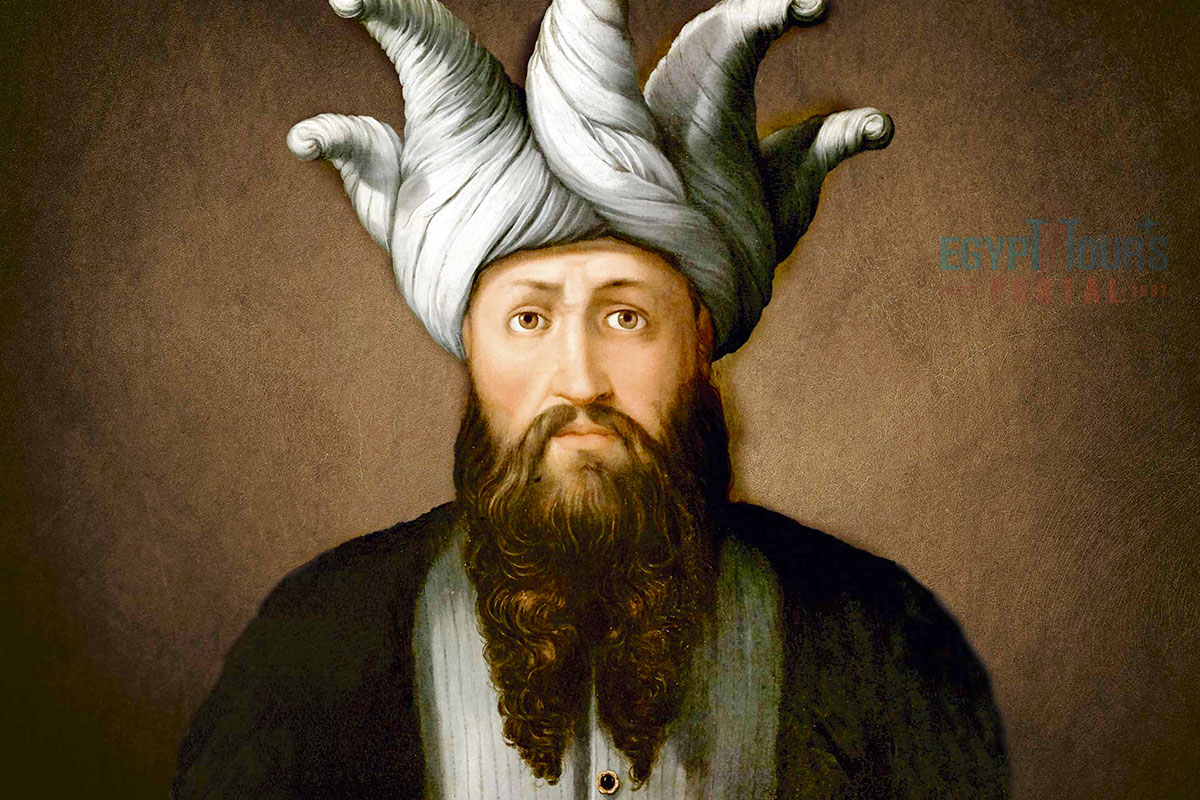
The family of Saladin, known as the Ayyubid family, originated from Kurdish roots and rose to prominence in the medieval Islamic world, establishing the influential Ayyubid dynasty. This family played a crucial role in Middle Eastern history, impacting political, military, and religious landscapes in Egypt, Syria, and other regions.
The Ayyubids not only unified large parts of the Islamic world against external threats, such as the Crusaders, but they also promoted the spread of Sunni Islam and were known for their architectural contributions. Here is an in-depth look at the members of Saladin's family, their influence, and their lasting legacy.
Saladin was blessed with a great number of family members who including his father and uncle, who made him the knight he was, and sons who wished to honor his legacy and expand the achievements and merits of their father to distant lands and times. Here are the names of all his family members:
Najm al-Din Ayyub was a respected military leader and served as the warden of Tikrit. He later became a trusted figure under Nur al-Din after relocating to Damascus. His guidance and support significantly influenced Saladin’s early life and career. Najm al-Din was instrumental in helping his son establish himself in Egypt, providing both military and political support.
Shirkuh was a prominent military commander and a key player in the Zengid court. He led the military expedition to Egypt on behalf of Nur al-Din to support the Fatimid vizier Shawar against Crusader threats. Shirkuh’s death in 1169 left a power vacuum in Egypt, which led to Saladin’s appointment as vizier. Shirkuh’s military acumen and loyalty to Nur al-Din laid the foundation for Saladin’s eventual rise.
Saladin’s marital alliances were often strategic, aimed at strengthening his influence and securing loyalty among regional leaders. He had multiple wives and children, who went on to play critical roles within the Ayyubid dynasty and regional governance. Some of which include:
One of Saladin's most notable marriages was to Ismat al-Din Khatun, the widow of his former lord Nur al-Din Zengi. This marriage symbolized the continuation of loyalty to Nur al-Din’s legacy and solidified Saladin’s influence in Syria. Though it is unclear how many wives he had in total, his marriages were political unions, reinforcing alliances and family bonds.
Saladin was survived by at least seventeen sons and one daughter, though not all of them became influential in the dynasty. Among his most notable children are:
Al-Afdal Nur ad-Din Ali: Saladin’s eldest son and initially his chosen successor. Al-Afdal ruled Damascus after his father’s death but faced internal challenges and was eventually overthrown by his uncle al-Adil.
Al-Aziz Uthman: Appointed Sultan of Egypt, Al-Aziz was known for his administrative skills and efforts to maintain Ayyubid control over Egypt. He tried to dismantle the Great Pyramids to symbolize the end of pharaonic influence, though his efforts were unsuccessful.
Al-Zahir Ghazi: Appointed as the ruler of Aleppo, Al-Zahir managed to secure the city as a stronghold of Ayyubid power. He was known for his dedication to his father’s legacy, defending Aleppo and consolidating Ayyubid authority in northern Syria.
Al-Mu’azzam Isa: Saladin’s grandson through his daughter, he ruled in Damascus and was noted for his patronage of architecture, including fortifying the city and commissioning the construction of the Ayyubid wall around Jerusalem.
Al-Adil I (Saladin’s Brother): Though not Saladin’s son, Al-Adil, also known as Saphadin, was one of Saladin’s closest and most trusted allies. After Saladin’s death, Al-Adil emerged as a strong leader and eventually became Sultan of the Ayyubid dynasty, effectively consolidating the family’s rule. He was known for his diplomatic skills and helped stabilize the Ayyubid realm.

Saladin’s architectural contributions remain an enduring part of his legacy, particularly in Egypt and Syria. Among his most iconic projects is the Citadel of Cairo, which he began constructing in 1176 to defend Egypt against Crusader attacks. The Citadel, situated on Mokattam Hill, was designed as a fortress with thick walls, strong towers, and strategic high ground to protect against invasion.
It became the administrative and military center of Cairo and a symbol of Ayyubid power. Within its walls, later rulers added the stunning Mosque of Muhammad Ali, enhancing the Citadel’s architectural significance.
Saladin also focused on building madrasas (religious schools) across Egypt and Syria to promote Sunni Islam, replacing the Shiite influence of the Fatimid Caliphate. His influence led to the construction of the Madrasa al-Firdaws in Aleppo, an educational institution promoting religious scholarship.
Saladin’s commitment to the preservation of sacred sites also extended to his restoration efforts in Jerusalem following its recapture, including the Dome of the Rock and Al-Aqsa Mosque. These architectural achievements underscore his vision for a fortified, united, and culturally rich Muslim realm.
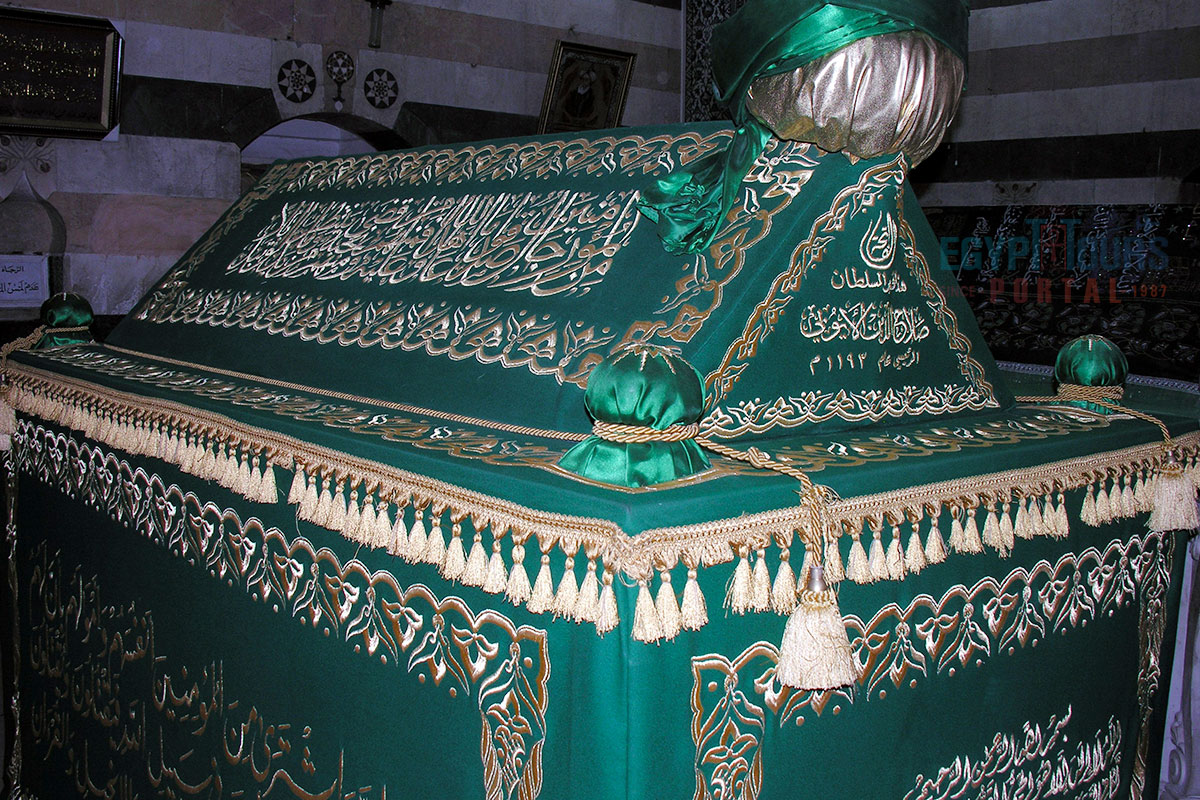
Saladin passed away on March 4, 1193, in Damascus after a period of illness, which was likely caused by exhaustion from years of campaigns and administrative responsibilities. His death marked the end of an era, as he left a legacy of unity and strength across his empire. Saladin was buried near the Umayyad Mosque in Damascus in a modest mausoleum, which still attracts visitors and pilgrims.
In keeping with his humility, Saladin left behind very little wealth, as he had generously given most of his riches to his soldiers, the poor, and charitable causes. His death was mourned widely, with chroniclers and historians across cultures and faiths commemorating his noble character and his contributions to both his people and his religion.
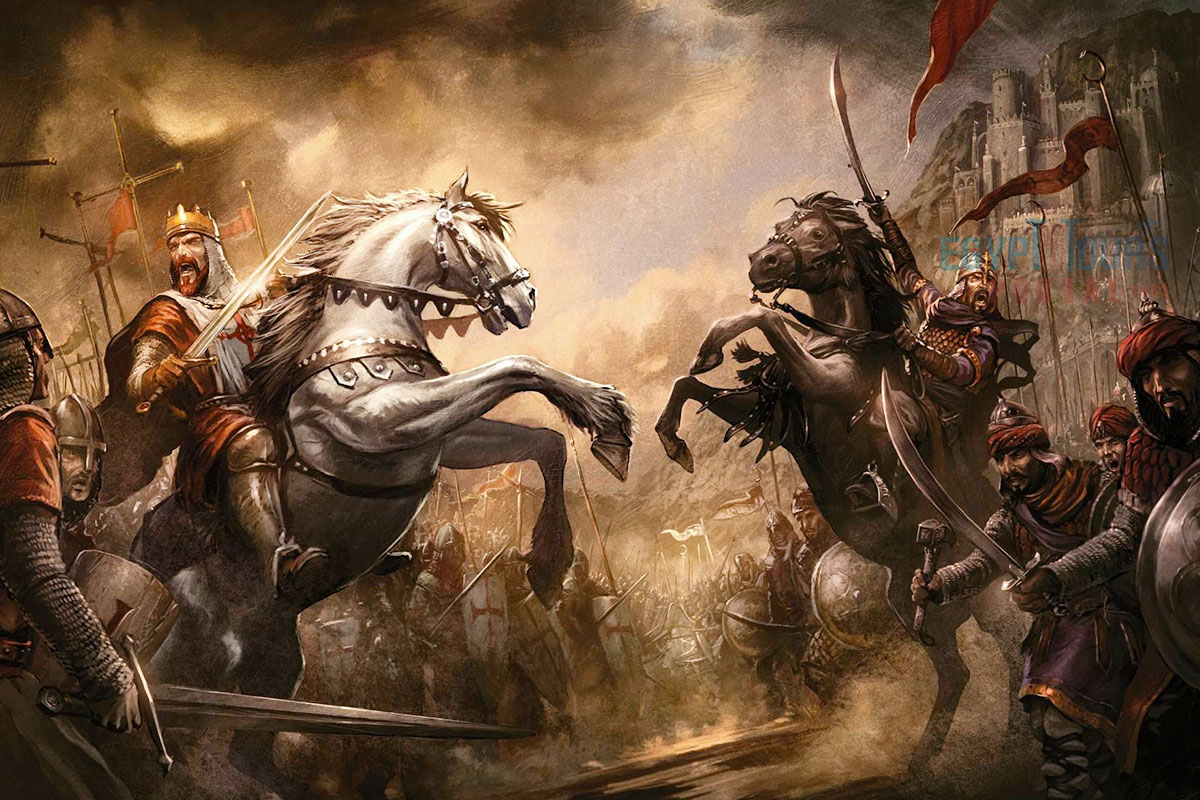
Saladin’s military career was defined by his unwavering dedication to defending the Islamic world from Crusader invasions, particularly during the Third Crusade. His most famous victory was the Battle of Hattin in 1187, which was fought near Lake Tiberias. Saladin strategically encircled and defeated the Crusader army, cutting off their access to water and using the desert heat to his advantage. This decisive victory led to the capture of Jerusalem and weakened the Crusader states, setting off a chain reaction that spurred the Third Crusade.
Following Hattin, Saladin focused on retaking key Crusader strongholds, leading to the Siege of Jerusalem. Unlike the previous Crusader capture of Jerusalem in 1099, which saw the slaughter of thousands of Muslims and Jews, Saladin allowed Christian inhabitants to leave the city safely, often with a negotiated ransom. This act of mercy solidified his reputation for chivalry and earned him respect among his Christian adversaries.
Later, during the Third Crusade, Saladin famously encountered King Richard the Lionheart, a formidable adversary, in a series of battles that included the Battle of Arsuf in 1191. Although Richard was able to secure some victories, he could not reclaim Jerusalem, and ultimately, a truce was negotiated between the two leaders. Saladin’s conduct throughout these campaigns established him as both a military strategist and a compassionate leader who sought to protect his people while respecting his enemies.
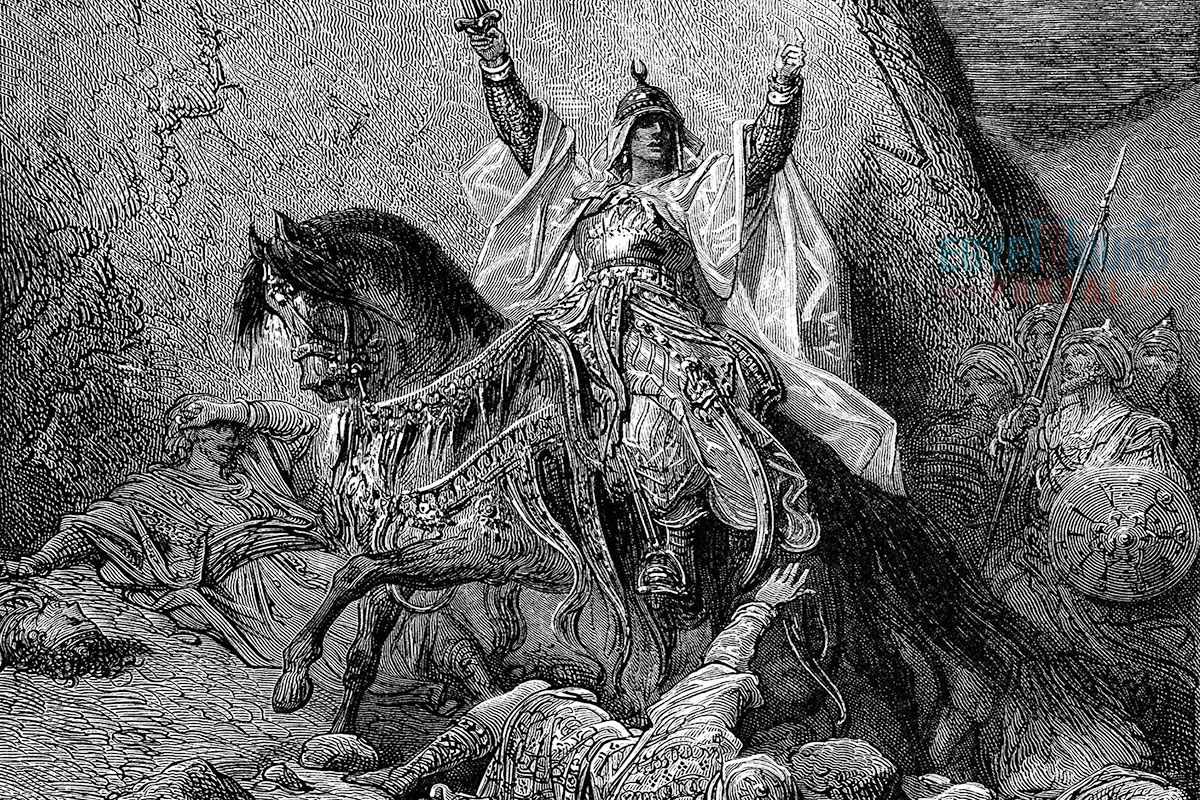
In 1193, Salah El-Din passed away and was buried in his Mausoleum in Damascus, Syria, outside the Umayyad mosque, but his legacy stayed intact, as in Arabic and Islamic history, he was considered to be a symbol of bravery and resistance.
And, even though he was considered an enemy all across Europe, he was admired for being a symbol for nobility, honor, and chivalry and shown in medieval art as being a great king and a heroic figure as when he took Jerusalem, he spared the lives of the Christian population and gave a safe passage to the defeated crusaders unlike when the first crusade slaughtered the entire city. He even sent over his physician to King Richard, who was wounded in battle.
Finally, hope to enjoy this article, and if you would like to explore the best attractions in the heavenly lands and waters of Egypt, then you can check our Egypt tours and Nile cruises, which will provide the most incredible travel experience across all the colossal attractions of Egypt that stood the test of time to narrate some of the most tales and visions of unique artistic architecture.
Private 4 Days Cairo Tour Packages for American Travelers 4 days Cairo Egypt Tour pa...
Tour Location: Cairo – Giza...
5 Days Cairo and Alexandria Tour Package For American Travelers 5 days Cairo and Ale...
Tour Location: Cairo/Giza/Alexandria...
6 Days Cairo, Luxor & Aswan Tour Package For American Travelers 6 days Cairo, Lu...
Tour Location: Cairo/Giza/Aswan/Luxor...
Amazing 7 Days Cairo and Hurghada Holiday for American Travelers 7 Days Cairo & ...
Tour Location: Cairo – Giza – Hurgh...
Saladin lived primarily in Egypt and Syria, with Cairo and Damascus serving as major administrative centers for his empire. After securing Egypt, he made Cairo a political stronghold from where he planned and executed his campaigns. Damascus, however, held special significance for him, especially after his unification of Syria. He spent his final years there, and it became the city of his burial. Both Cairo and Damascus benefited from Saladin’s building projects, including fortifications, religious institutions, and public works.
Jerusalem was surrendered to Saladin in 1187 by Balian of Ibelin, a noble of the Kingdom of Jerusalem and one of the city’s key defenders. Balian negotiated terms with Saladin, who agreed to allow Christian residents to leave peacefully upon paying a ransom. Those who could not afford the ransom were often released through charity led by Saladin’s brother, al-Adil. Balian’s surrender marked a significant moment in the Crusades, showcasing Saladin’s emphasis on humane treatment of conquered populations.
Saladin founded the Ayyubid Dynasty, named after his father, Najm al-Din Ayyub. This dynasty ruled a vast region that included Egypt, Syria, parts of the Arabian Peninsula, and Upper Mesopotamia from 1169 until the mid-13th century. The Ayyubids unified many parts of the Muslim world, strengthened Sunni Islam, and became known for their architectural and cultural achievements.
In Arabic, "Salah" translates to "righteousness" or "integrity", and in Saladin’s case, his full name Salah al-Din means "The Righteousness of the Faith." This honorific reflected his dedication to Islamic values, justice, and his commitment to the defense and unity of the Muslim world.
Saladin is celebrated as a hero for his success in unifying Muslim territories, defending them against the Crusaders, and recapturing Jerusalem. His leadership was marked by compassion, mercy, and a sense of justice that was unusual for his time. Even Christian chroniclers respected him for his chivalry and fairness, describing him as a model of noble conduct. Saladin’s strategic victories and his emphasis on humane treatment of his enemies made him a figure of reverence in both the Islamic world and beyond.
Although King Richard the Lionheart of England challenged Saladin during the Third Crusade and won several battles, he was ultimately unable to capture Jerusalem. The two leaders agreed to a truce in 1192, allowing Crusaders limited access to Jerusalem for pilgrimage while maintaining Muslim control of the city. Thus, Saladin was never fully defeated in battle and retained control over Jerusalem until his death.
Saladin ruled Jerusalem from its capture in 1187 until he died in 1193, a period during which he allowed religious tolerance and safe passage for Christian pilgrims. His rule over Jerusalem emphasized coexistence and respect for the city’s religious significance to multiple faiths.
Yes, Saladin fathered at least seventeen sons and one daughter, though not all played significant roles in the Ayyubid dynasty. Notable among his sons were Al-Afdal, who initially ruled Damascus, Al-Aziz, the Sultan of Egypt, and Al-Zahir, who governed Aleppo. His descendants continued to rule under the Ayyubid dynasty, helping to stabilize the territories that Saladin unified.
Saladin was a Sunni Muslim, devoted to the principles of Sunni Islam, which he actively promoted across his territories. Upon taking control of Egypt, he ended the Shiite Fatimid Caliphate’s rule and established Sunni governance aligned with the Abbasid Caliphate. Saladin’s religious policies emphasized unity and the establishment of Sunni religious institutions, reinforcing Sunni Islam’s influence throughout his empire.
The entire country of Egypt deserve to be explored with its every heavenly detail but there are places that must be seen before any other such as the breathtaking Hurghada's red sea, The wonders of Cairo the pyramids of Giza, the great sphinx, the Egyptian Museum, Khan El Khalili Bazaar, the wonders of Luxor like Valley of the Kings, Karnak & Hatshepsut temple and the wonders of Aswan such as Abu Simbel temples, Philea temple, Unfinished obelisk and The Wonders of Alexandria like Qaitbat Citadel, Pompey's Pillar and Alexandria Library. Read more about the best places to visit in Egypt.
If you want to apply for a Visa On Arrival that lasts for 30 days then you should be one of the eligible countries, have a valid passport with at least 6 months remaining and pay 25$ USD in cash, as for the E-Visa for 30 day you should have a valid passport for at least 8 months, complete the online application, pay the e-visa fee then print the e-visa to later be presented to the airport border guard. You could also be one of the lucky ones who can obtain a free visa for 90 days. Read more about Egypt travel visa.
Egypt has a variety of delicious cuisines but we recommend “Ful & Ta’meya (Fava Beans and Falafel)”, Mulukhiya, “Koshary”, a traditional Egyptian pasta dish, and Kebab & Kofta, the Egyptian traditional meat dish.
The best time to travel to Egypt is during the winter from September to April as the climate becomes a little tropical accompanied by a magical atmosphere of warm weather with a winter breeze. You will be notified in the week of your trip if the Climate is unsafe and if any changes have been made.
You should pack everything you could ever need in a small bag so you could move easily between your destinations.
We have been creating the finest vacations for more than 20 years around the most majestic destinations in Egypt. Our staff consists of the best operators, guides and drivers who dedicate all of their time & effort to make you have the perfect vacation. All of our tours are customized by Travel, Financial & Time consultants to fit your every possible need during your vacation. It doesn't go without saying that your safety and comfort are our main priority and all of our resources will be directed to provide the finest atmosphere until you return home.
You will feel safe in Egypt as the current atmosphere of the country is quite peaceful after the government took powerful measures like restructuring the entire tourist police to include all the important and tourist attractions in Egypt. Read more about is it safe to travel to Egypt.
Wear whatever feels right and comfortable. It is advised to wear something light and comfortable footwear like a closed-toe shoe to sustain the terrain of Egypt. Put on sun block during your time in Egypt in the summer to protect yourself from the sun.
The best activity is by far boarding a Nile Cruise between Luxor and Aswan or Vise Versa. Witness the beauty of Egypt from a hot balloon or a plane and try all the delicious Egyptian cuisines and drinks plus shopping in old Cairo. Explore the allure and wonders of the red sea in the magical city resorts of Egypt like Hurghada and many more by diving and snorkeling in the marine life or Hurghada. Behold the mesmerizing western desert by a safari trip under the heavenly Egyptian skies.
There are a lot of public holidays in Egypt too many to count either religious or nation, the most important festivals are the holy month of Ramadan which ends with Eid Al Fitr, Christmas and new years eve. Read more about festivals & publich holidays in Egypt.
Egypt is considered to be one of the most liberal Islamic countries but it has become a little bit conservative in the last couple of decades so it is advised to avoid showing your chest, shoulders or legs below the knees.
Arabic is the official language and Most Egyptians, who live in the cities, speak or understand English or at least some English words or phrases. Fewer Egyptians can speak French, Italian, Spanish, and German. Professional tour guides, who work in the tourism sector, are equipped to handle visitors who cannot speak Arabic and they will speak enough English and other languages to fulfill the needs of all our clients.
The fastest way is a car, of course, a taxi. If you are in Cairo ride a white taxi to move faster or you could board the fastest way of transportation in Egypt metro if the roads are in rush hour.
The temperature in Egypt ranges from 37c to 14 c. Summer in Egypt is somehow hot but sometimes it becomes cold at night and winter is cool and mild. The average of low temperatures vary from 9.5 °C in the wintertime to 23 °C in the summertime and the average high temperatures vary from 17 °C in the wintertime to 32 °C in the summertime. The temperature is moderate all along the coasts.
It is the home of everything a traveler might be looking for from amazing historical sites dating to more than 4000 years to enchanting city resorts & beaches. You will live the vacation you deserve as Egypt has everything you could possibly imagine.









